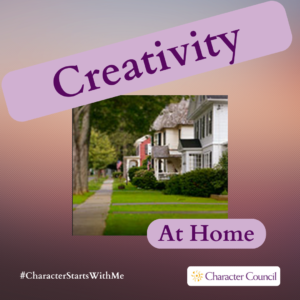
Creativity In the Community
vs. underachievement
Approaching a need, a task, or an idea from a new perspective
“Combinatorial Community”
-Ralph Brueggemann, guest contributor
It is creative combinations from individuals in communities that allow for meaningful progress in our lives. Our communities are the foundation for all types of transformational change throughout our history.
In Florence Italy, around the 14th century, the Medici banking family provided the resources for many artistic endeavors, phenomenally advancing the arts. During this period of history, there was a coalescing of ideas that had a multiplying effect known as the “Medici effect.”[1] For instance, Michelangelo Buonarroti’s many achievements included the painting of the ceiling of the Sistine Chapel and sculpting both “David” and “Pieta.”[2] The “Medici effect” was a synergistic result of a confluence of ideas, cultures, and disciplines brought together through association, the Power of And. The Power of And is the unifying concept for broadening your approach to transformational progress through innovation and is a way for everyone to combine all aspects of their intellect to achieve meaningfully significant innovations.
The Power of And can coalesce our imaginations. Einstein said, “Imagination is more important than knowledge.”[3] To trigger your imagination, start with changing your perspective by choosing to learn something new that allows you to break away from what you are doing. This could be watching a movie, performing a sport, listening to music, playing a musical instrument, reading a book, meeting new people, or taking a vacation. Allow your mind to combine ideas, generating more ideas that you were not expecting. Einstein said, “Combinatory play seems to be the essential feature in productive thought.”[4] Your mind will associate disparate ideas and stumble upon solutions that were otherwise hidden. “Celebrated creators – artists, writers, scientists, inventors – have always known the power of the synthesizing mind and have advocated for embracing the building blocks of combinatorial creativity.”[5]
Arthur Koestler named this the Power of And concept “bisociation” to describe the blending of elements drawn from two previously unrelated matrices of thought into a new matrix of meaning by way of a process involving comparison, abstraction and categorization, analogies, and metaphors.[6] “Einstein famously attributed some of his greatest physics breakthroughs to his violin breaks, which he believed connected different parts of his brain in new ways.”[7]
As John Lewis said, “Do not get lost in a sea of despair. Be hopeful, be optimistic. Our struggle is not the struggle of a day, a week, a month, or a year, it is the struggle of a lifetime. Never, ever be afraid to make some noise and get in good trouble, necessary trouble.” The communities that adopt authentic diversity, equity, and inclusivity in their decision-making process have an opportunity to solve today’s social, environmental, and leadership challenges using the Power of And.
The community that focuses on bottom-up organizing to reach out to all stakeholders at all levels of leadership can have more impact than a single individual. For instance, César Chávez, an American labor leader and civil rights activist said, “Well, first you talk to one person, then you talk to another person, then you talk to another person.” The community group will provide support for the combined voices of the people affected so all can be heard. The community group will develop a common bond and vision and become a force for mutually supported positive activism that unleashed the Power of And.
Ralph Brueggemann is an Adjunct Professor at the College of Engineering and Applied Science at the University of Cincinnati with a focus on interdisciplinary innovation. Co-author of a book on innovation and entrepreneurship.
[1] Frans Johansson, Medici Effect: What Elephants and Epidemics Can Teach Us About Innovation, (Boston: Harvard Business School Press, 2006).
[2] Wikipedia, s.v. “The Agony and the Ecstasy,” accessed August 6, 2011, http://en.wikipedia.org/wiki/The_Agony_and_the_Ecstasy_(novel).
[3] George Sylvester Viereck, accessed February 14, 2021, Imagination Is More Important Than Knowledge – Quote Investigator
[4] Maria Popova, “How Einstein Thought: Why “Combinatory Play” Is the Secret of Genius,” August 14, 2013, accessed February 14, 2021, https://www.brainpickings.org/2013/08/14/how-einstein-thought-combinatorial-creativity/
[5] Maria Popova, “Combinatorial Creativity and the Myth of Originality,” June 6, 2012, accessed February 14, 2021, Combinatorial Creativity and the Myth of Originality | Innovation | Smithsonian Magazine
[6] Wikipedia, s.v. “The Act of Creation,” accessed February 14, 2021, The Act of Creation – Wikipedia
[7] Maria Popova, “Networked Knowledge and Combinatorial Creativity,” August 1, 2012, accessed February 14, 2021, https://www.brainpickings.org/2011/08/01/networked-knowledge-combinatorial-creativity/
The Links below will take you to Resources you can use with the family or within community organizations
to teach the Character Quality of Creativity.
The following activities are related to dates this month and can relate to any character quality or good character in general.
March Character All Month
See NationalToday, AndTodayIs, NationalDayCalendar or DaysOfTheYear for more information on these and other holidays to celebrate this month. Day in Mar 2024 Holiday How to Commemorate with Character 1 National Peanut Butter Lover’s Day. It's National #PeanutButter...
St. Patrick’s Day Activity
Celebrate St. Patrick’s Day by identifying the Character Quality associated with the following Irish proverbs: Complain that you have no shoes until you meet a man who has no feet. (Gratefulness) Many a ship is lost within sight of the harbor. (Determination) It’s not...
National Crayon Day, March 31
Crayons are a great way to be Creative from simply using them to draw or color a picture to getting fancy with melting them (with adult supervision) for more involved crafts. For more information on National Crayon Day visit the website at...
Our other Pillars have resources that can be used in a community or family setting.
Visit Creativity in School>>
Activities
No Matter How You Say It
Curriculum Connections
Croskey’s Corner
Visit Creativity in Business>>
Teambuilding
Power Up with Character
Interview Questions
Adult Business Books
Visit Creativity in Faith>>
Christian Family Activity
Bible Verses
Christian Poster
Prayer and Reflections
Archived Resources
